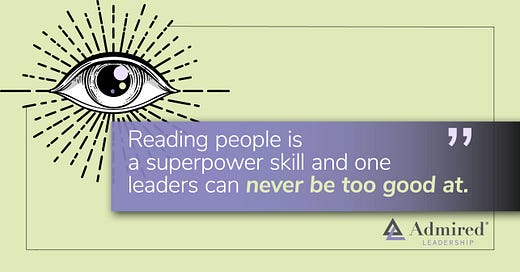Have you compared notes with a colleague and realized you had an entirely different take on how a meeting went or how someone responded to a situation? Reading people is a superpower skill and one leaders can never be too good at.
Because people hide their true feelings and beliefs, interpreting others accurately is no easy task. Leaders have to look for clues as to what others are really thinking and feeling.
In addition to what people say, body posture, countenance, word choice, hand gestures, and eye expressions point the way. This is more art than science, but the accuracy of our judgments depends heavily on experience and knowing later whether we were accurate or not.
Practice requires using all the clues available to read what emotions and thoughts people have. We then must learn how on target we have been.
To enhance our abilities, we should focus on elements we often fail to consider, such as head nods, shoulder drops, vocal pitch, and tone. The idea is to practice continually so we can develop the power to read people accurately with very little information to go on.
A leader who can read people well possesses a huge asset. The ability to assess what is really going on in the minds of those who guard their thoughts and feelings can save leaders oodles of time.
Better yet, leaders who can accurately read others can better adapt their messages for effectiveness. How good are you at reading people?
To assess one slice of this interpretive skill, try the “Reading the Eyes Test” designed by clinical psychologist Simon Baron Cohen that asks you to read emotions from peoples’ eyes. You can take the quick test here.
With only photos of eyes to make emotional inferences, how accurately can you judge emotions? (The test only takes 10 minutes!) The results may surprise you. While eyes are just one telltale sign of emotions and thoughts, they are a great place to start to improve. For leaders, minds were made for reading. Time to get better at it.





I think we'd be better off working on getting better at Active Listening than trying to get better at reading minds. Just my opinion.
Great pragmatic insight by @Admired Leadership.